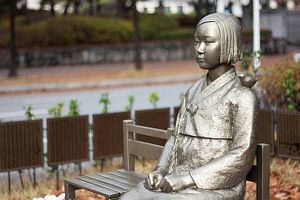Mitte, Berlin’s central borough, passed a resolution on December 1 allowing a “comfort women” statue to be maintained until September 2021, rejecting the Japanese government’s bid to remove it. “Comfort women” is a euphemism for women forced into prostitution for the Japanese military during World War II.
The statue was installed in Mitte with the permission of the borough office in late September. Ever since, the Japanese government has pressed officials related to the decision to remove the statue as soon as possible.
Following the request of Korea Verband, a civic group mainly consisting of South Koreans based in Berlin, the Mitte borough office permitted installing the statue. However, it suddenly reversed course and announced it would remove the statue after getting heavy pressure from the Japanese government in October.
Korea Verband and other Berliners familiar with the comfort women issue complained to the office about its about-face, pushing instead for the resolution that passed last week.
On December 1, 24 out of 29 council members agreed to pass the resolution, which promises to maintain the statue until at least September 2021 and explore keeping the statue permanently.
The Japanese government immediately reacted against the decision.
“We will continue to press [Berlin] for an early removal of the statue while explaining the position of the Japanese government to various officials,” said Kato Katsunobu, the chief cabinet secretary for Prime Minister Suga Yoshihide, at a briefing after the Mitte borough council passed the resolution.
Under the resolution, the Mitte borough office, borough assembly, and related civic groups are going to discuss how to keep the statue permanently in the region.
“It is one step that can install the ‘comfort women’ statue permanently. We will also be able to discuss issues regarding sexual abuse so it is a very important resolution,” said Han Jeong-hwa, head of Korea Verband, in an interview with local news media in Seoul.
The South Korean government has not officially made any comments on this issue, as weighing in could open up another front in the diplomatic dispute between South Korea and Japan. Also, Seoul was not directly involved, since the civic group was the main party championing the Mitte resolution.
The Japanese government’s main reason for demanding the removal of the statue was that the inscription was inaccurate. The inscription of the statue that implies comfort women had been sexually abused by the Japanese military during World War II and that they were “sex slaves.” The Japanese government maintains that the military was not directly involved in recruiting comfort women, and that the women voluntarily provided sexual services. But there is clear evidence to the contrary.
“The Japanese government has said that ‘comfort women’ were not sexual slaves by saying that they got paid,” Hosaka Yuji, a professor at Sejong University in Seoul, said in an interview with The Diplomat. But the women thought “that they were going to work at Japanese corporations, not be sexual slaves for Japanese forces. The Japanese government swindled ‘comfort women’ and their family into sexual extortion under the pretext of finding employment.”
Miyazawa Kiichi, who served as a Japanese prime minister from 1991 to 1993, apologized officially for those who suffered indescribable hardships during World War II in a speech at the House of Councilors on January 29, 1992. He also mentioned comfort women during the speech, making him the first Japanese prime minister to acknowledge and apologize for what the Japanese forces did to the comfort women.
However, more recently former Prime Minister Abe Shinzo said there is no evidence that the Japanese military had forcibly taken comfort women – which implies that the women had voluntarily become sexual slaves for Japanese forces – even after the “2015 Comfort Women Agreement” between South Korea and Japan.
Ban Ki-moon, the first Korean to serve as U.N. secretary general, praised the efforts by the two countries to settle the comfort women issue via the 2015 agreement, which was reportedly mediated by the United States. But the agreement was not completely acceptable for the most important people involved: the comfort women themselves.
One key demand from the victims has always been for the Japanese government to clearly and completely admit what the Japanese military did to Koreans, including comfort women. And on this point, the Japanese government again let Koreans down.
South Korean President Moon Jae-in demanded the Japanese government make a sincere apology to comfort women when breaking up the organization that was established under the 2015 agreement to support the victims with 1 billion yen (about $8 million) from the Japanese government. But the Japanese government said South Korea should keep promises made by both countries, without admitting the history or apologizing directly to comfort women.
Moon also added that he will not abrogate the 2015 agreement nor ask the Japanese government to renegotiate it. That was the South Korean government’s de facto notice that it will not settle this issue without a sincere apology from the Japanese government.
“No more talks about the ‘comfort women’ issue was what the Japanese government wanted when the two countries agreed in 2015,” Hosaka, the Sejong University professor, said.
Japan’s main goal for making an agreement in 2015 was clear: Blocking Koreans from highlighting Japan’s war crimes during World War II to the international community.
“There have been many failures of installing ‘comfort women’ statues in other countries, including Australia, through the Japanese government’s disruption and it will continue to happen,” Hosaka said. The professor added, however, that the success in Germany, which has never shied away from apologizing for its war crimes during World War II, could provide momentum for civic groups to install similar statues in many other countries.
There are now just 16 surviving comfort women in South Korea, who are still looking for the Japanese government’s sincere apology and reflections. As most of them are over 80, there is not much time left to heal their pain.

































